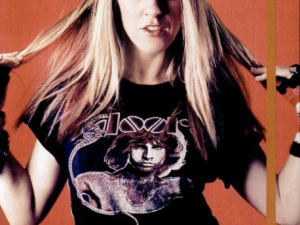Eight Chicks with Picks Who Rock our World
ALMOST UNWITTINGLY, LIZ PHAIR SHOOK THE ROCK WORLD IN 1993 with the low-fi Exile in Guyville (Matador), a clever, song-by-song response to the Rolling Stones’ Exile on Main Street that featured made-up guitar chords, flat singing and extremely frank, sexual lyrics. A native of a posh Chicago suburb and a former art student, Phair had merely been making 4-track tapes in her bedroom prior to recording Guyville (the title of which was a jab at Chicago’s exclusionary, male-dominated indie rock scene), and was completely unprepared for stardom. Her second album, Whip-Smart, wasn’t nearly as well-received as her debut, and Phair’s refusal to tour, largely due to stage fright, didn’t help. She pulled a Patti Smith, retreating from rock and plunging into marriage and motherhood.
In 1998, Phair released the long-awaited WhiteChocolateSpaceEgg (Matador / Capitol). With its more conventional pop song structure and narratives replacing her once-intimate lyrics, the album was obviously designed to make her a superstar. And with her stint on last summer’s popular Lilith Fair tour, Phair finally appears ready to play that role.
RECOMMENDED LISTENING:
Exile in Guyville (Matador / Capitol, 1993)
GUITAR WORLD: I’ve read that you didn’t dream of being a rock star while growing up — was that because you felt you didn’t have any female musician role models?
LIZ PHAIR: Probably. Most of the famous women I looked up to were movie stars, not musicians. I wanted to date rock stars; I never, ever wanted to be one. I was working on my art career when my tapes started getting attention, so I wasn’t exactly prepared for a career in music. I had no experience on stage at all.
GW: Your stage fright is legendary; how did you overcome it to do the Lilith Tour?
PHAIR: I look at Lilith as the birth of my stage career, because I accepted the responsibility that I am a performer and that this is my job. I got a vocal coach and learned to animate my face in front of 20 thousand people. And being around all of those women really inspired me; I wanted to be part of that group so badly.
GW: Prior to Lilith, you’d only worked with men on your records and in bands. Was the dynamic that much different?
PHAIR: Yes, it was. Men think they know better than you. Just because I’m not experienced enough to speak their language — because I haven’t worked at a recording studio for 20 years — they thought I didn’t have a legitimate musical vision. It’s all about trying to help a songwriter express their songs, and I had to beat their brains in constantly to remind them that my opinion mattered as much, if not more, than theirs.
GW: Do you think you’ll have a real impact on the next generation of women musicians?
PHAIR: I think so. All the young girls who were at Lilith saw women being the leaders of their bands and expressing their lives, and that’s huge. I can’t think of anything in my childhood that came even close to that.
Note: The above is an excerpt of the full article. The other seven women/bands profiled for this piece were Sleater-Kinney, The Donnas, Mary Timony of Helium, Nashville Pussy, Mary Cutrufello, The Pristeens, and the 5.6.7.8.s.
By Meredith Ochs
Guitar World, January 1999







